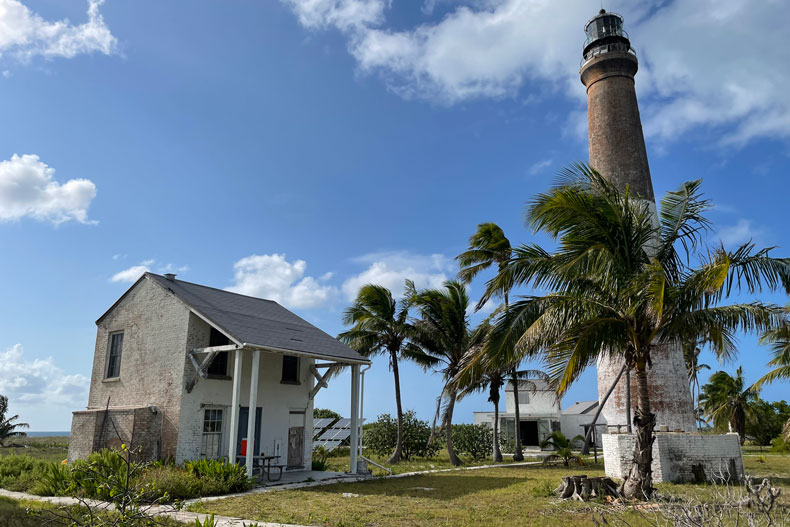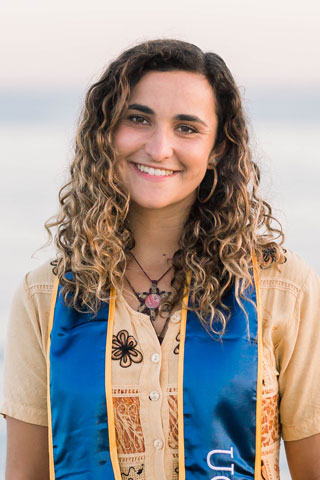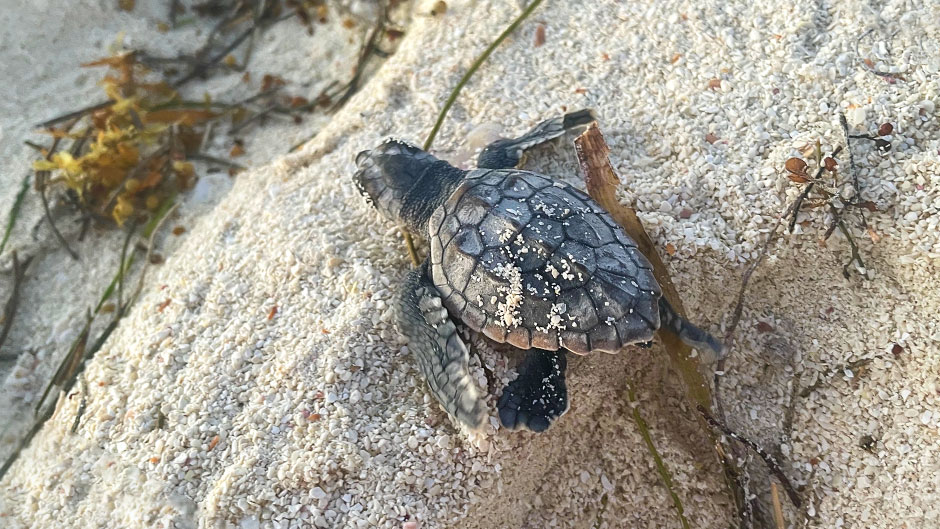Alone in a lighthouse more than 70 miles off the coast of Key West, Hannah Ditzler gets up each morning at 5:45 on Loggerhead Key, an uninhabited tropical island located in the Gulf of Mexico. For 10 days at a time, she’s responsible for monitoring sea turtle nesting activity on the high tide line of the Dry Tortugas National Park.
A six-month internship funded by The Alliance for Florida’s National Parks gives Ditzler the opportunity to do the research. She works from sunrise to sunset to get population estimates and ensure the health of two species of sea turtles in Florida—the loggerhead and green sea turtles.
“The two species have very distinct tracks on the beach,” said Ditzler, a Rosenstiel School of Marine and Atmosphere Science graduate student. “My job is to look for tracks of either species, identify the species by the track, and then follow that track up to its apex, or the highest point on the beach, to see if the sea turtle nested or laid eggs in the sand.”

The graduate student’s investigation shows that the population of green sea turtles has been slowly increasing statewide, while loggerhead sea turtle populations have been relatively stable. “That being said, sea turtles still face many threats,” said Ditzler. “Bycatch in fishing gear is a huge problem, as is entanglement in anthropogenic marine debris.”
According to Ditzler and her findings, sea level rise already has reduced and will continue to reduce nesting habitats. Warming global temperatures also impact hatchling sex ratios. “Turtles have temperature dependent sex determination, meaning incubation temperature determines the sex of hatchlings,” pointed out Ditzler. “Increasing temperatures skew the sex ratio, producing more females than males. This has a huge impact on the breeding population.”
The legal protections set in place by the United States and sea turtle conservation groups around the globe are essentially helping; but according to Ditzler, humans must continue to do their part by being vigilant.
“Sea turtle populations could very well start to decline again,” she said. “We think current sea turtle populations are less than 10 percent of what they were before human impact, so we still have some work to do.”

Last year, during the height of the pandemic—after her graduation from the University of California, Santa Barbara, with her bachelor’s degree in environmental science—Ditzler was eager to join a program that would afford her hands-on experience. After applying to several programs from coast to coast, the master of professional science program with a degree concentration in fisheries management and conservation at the Rosenstiel School offered everything she desired.
“I really value being in person and being able to meet and interact with fellow students and professors,” said Ditzler, who also enjoys the solitude that being on the remote island brings her. Despite the 15 to 20 visitors the island gets a day, Ditzler said working alone has taught her a multitude of life lessons.
“Never have I worked in such a remote and self-sustaining area,” she said. “The entire island is run on solar panels. We produce our own water through a reverse osmosis machine—so we pull in salt water and are turning it into fresh water—and part of the requirements of the position is that I have to keep everything running.” In addition to adding water to the reverse osmosis machine, she has to change batteries for the solar panels to make sure they continue to operate.
“This opportunity has definitely taught me a lot of life skills in terms of being handy, how to troubleshoot things, and just figure stuff out on my own,” Ditzler said. “In terms of research, it’s going to be super helpful having this field work experience and for building a career in conservation.”

